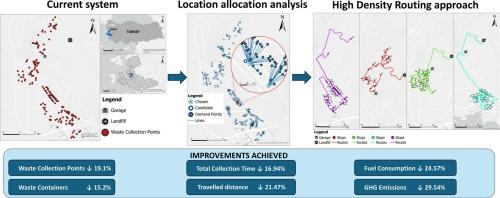Optimizing municipal solid waste collection with GIS-Based High-Density routing and zoning
IF 7.7
1区 工程技术
Q1 ENVIRONMENTAL STUDIES
Transportation Research Part D-transport and Environment
Pub Date : 2025-09-24
DOI:10.1016/j.trd.2025.105012
引用次数: 0
Abstract
Inefficient routing remains a critical challenge in municipal solid waste (MSW) management. This study aims to improve MSW collection for dispersed collection points through a case study in the Çiğli District of İzmir, Turkey. GIS-based analyses were used to optimize collection routes with the aim of minimizing working time, reducing fuel consumption and travel distance, as well as lowering exhaust emissions. Different routing scenarios were compared, including zoning and non-zoning approaches, using arc and node routing problem types. The high-density routing scenario, in which the built-in GIS-based VRP solver was configured with U-turn restrictions to emulate a capacitated arc routing problem, provided the best improvement. Compared to the current system, this scenario achieved 16.94% savings in collection time, 21.47% in travel distance, 24.57% in fuel consumption, and 29.54% in CO2 emissions. Additionally, the overall municipal greenhouse gas emissions were reduced by 2.36%. This approach is practically adaptable through easy implementation and requires no custom algorithms. The study demonstrates the environmental and operational benefits of systematic MSW collection optimization.

基于gis的高密度路径和分区优化城市固体废物收集
在城市固体废物(MSW)管理中,低效路由仍然是一个严峻的挑战。本研究旨在通过对土耳其İzmir Çiğli地区的案例研究,改善分散收集点的城市生活垃圾收集。基于gis的分析用于优化收集路线,以最大限度地减少工作时间,减少燃料消耗和行驶距离,并降低废气排放。比较了不同的路由方案,包括分区和非分区方法,使用弧线和节点路由问题类型。在高密度路由场景中,内置的基于gis的VRP求解器配置了u型转弯限制来模拟电容弧路由问题,提供了最好的改进。与现有系统相比,该方案节省了16.94%的收集时间、21.47%的行驶距离、24.57%的燃油消耗和29.54%的二氧化碳排放。城市温室气体排放总量减少2.36%。这种方法易于实现,实际上适应性强,不需要自定义算法。该研究论证了系统的城市生活垃圾收集优化的环境效益和运行效益。
本文章由计算机程序翻译,如有差异,请以英文原文为准。
求助全文
约1分钟内获得全文
求助全文
来源期刊
CiteScore
14.40
自引率
9.20%
发文量
314
审稿时长
39 days
期刊介绍:
Transportation Research Part D: Transport and Environment focuses on original research exploring the environmental impacts of transportation, policy responses to these impacts, and their implications for transportation system design, planning, and management. The journal comprehensively covers the interaction between transportation and the environment, ranging from local effects on specific geographical areas to global implications such as natural resource depletion and atmospheric pollution.
We welcome research papers across all transportation modes, including maritime, air, and land transportation, assessing their environmental impacts broadly. Papers addressing both mobile aspects and transportation infrastructure are considered. The journal prioritizes empirical findings and policy responses of regulatory, planning, technical, or fiscal nature. Articles are policy-driven, accessible, and applicable to readers from diverse disciplines, emphasizing relevance and practicality. We encourage interdisciplinary submissions and welcome contributions from economically developing and advanced countries alike, reflecting our international orientation.

 求助内容:
求助内容: 应助结果提醒方式:
应助结果提醒方式:


